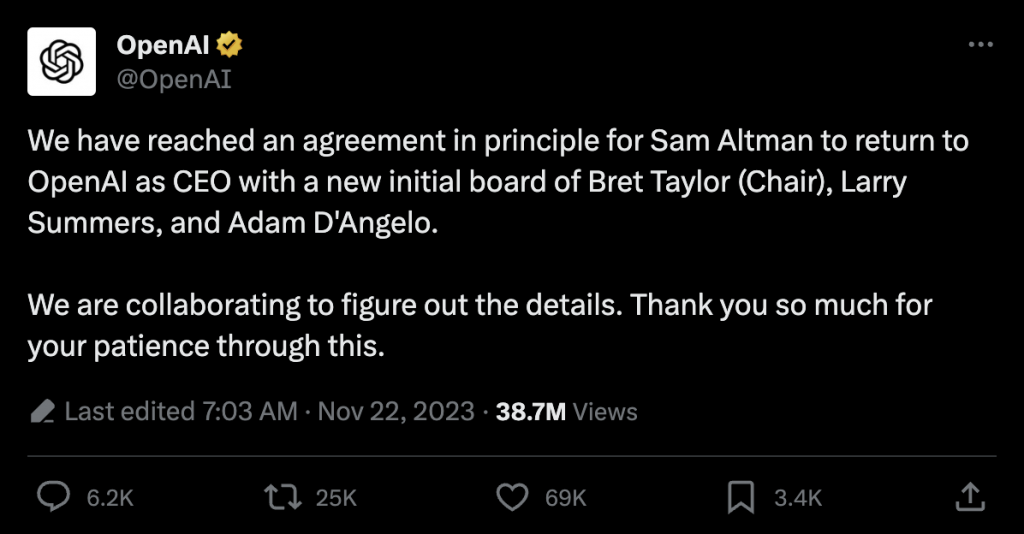“Market Shockwave: Sam Altman’s Exit from OpenAI and the Financial Domino Effect on the AI Industry”
- Non-Equity-Laith
- November 24, 2023
- Uncategorized
- 0 Comments
Houston, November 2023 — The artificial intelligence industry recently witnessed a seismic shift with the ousting of Sam Altman from the CEO position at OpenAI. This development has stirred significant interest in the financial sector. This article delves into the financial implications of this leadership transition, drawing on critical events and their potential impacts on the industry and investors.
The Ousting of a Visionary Leader
Sam Altman’s removal as CEO of OpenAI, a company at the forefront of AI innovation, was unexpected. The board cited a loss of confidence in Altman’s leadership, explicitly questioning his candor in communication. Altman, a prominent figure in the AI industry, has since moved to Microsoft to lead a new AI research group, taking other key OpenAI personnel with him.
Employee Backlash and Organizational Stability
The reaction within OpenAI was immediate and dramatic. Nearly all of OpenAI’s 700 employees threatened to resign, demanding the former President’s reinstatement of Altman and Greg Brockman. This level of employee unrest is rare and highlights potential risks in organizational stability and project continuity, factors critical to investor confidence.
Microsoft’s Strategic Move
Microsoft’s quick action to absorb key talent from OpenAI, including Altman and co-founder Brockman, is a strategic win. This stabilizes their billion-dollar investment in OpenAI and positions Microsoft favorably against rivals like Google and Amazon in the AI arms race. For investors, Microsoft’s enhanced AI capabilities could signal long-term growth prospects, especially in business solutions utilizing AI technology.
OpenAI’s New Leadership and Future Direction
Emmett Shear’s appointment as interim CEO of OpenAI signals a potential shift in the company’s strategic direction. Shear’s commitment to investigating the firing and considering new governance structures may bring stability. However, his statement favoring a slowdown in AI development could impact OpenAI’s competitiveness and, by extension, its financial attractiveness.
Regulatory Landscape and AI Policy Impact
Altman’s role in shaping AI policy and advocating for laws to mitigate AI risks cannot be overlooked. His departure may influence the future regulatory landscape for AI. Financial stakeholders must monitor these developments closely, as regulations can significantly impact the speed and nature of AI innovations and their market applications.
Internal Divisions and Industry-wide Concerns
The events at OpenAI shed light on internal divisions over AI development philosophies. This rift between safety-focused and rapid-commercialization factions within OpenAI echoes a broader industry debate. Such philosophical differences can dictate the pace of AI advancements and affect market dynamics and investment opportunities.
Key Takeaways
Sam Altman’s departure from OpenAI and subsequent shift to Microsoft marks a critical juncture in the AI industry. It raises crucial questions about leadership, organizational stability, talent retention, regulatory influence, and the strategic direction of AI development. These factors are pivotal for financial analysts and investors in gauging the future trajectory of the AI sector and identifying sound investment opportunities. As the situation evolves, it will be imperative for financial stakeholders to stay informed and adapt their strategies accordingly.

Altman’s Return: OpenAI’s Strategic Pivot
Sam Altman’s reappointment as OpenAI’s CEO, following his sudden departure, marks a pivotal moment in the organization’s evolution and the broader AI industry. This development, amidst intense deliberations about OpenAI’s future, signifies a potential shift in the company’s strategic focus. Renowned for its innovative AI projects like ChatGPT, OpenAI has been at the intersection of managing AI’s potential risks and exploring its commercial opportunities. Altman’s comeback, along with a new board featuring industry luminaries such as Bret Taylor and Larry Summers, indicates a reorientation in OpenAI’s governance and strategic objectives. This change might herald a new phase in OpenAI’s journey, striking a balance between pioneering AI innovation and ensuring its beneficial application.

Revisiting Leadership: Altman and OpenAI Dynamics
The initial lack of clarity surrounding Altman’s departure, attributed to governance issues at OpenAI, had sparked widespread speculation regarding the company’s future direction. His reinstallation as CEO, especially with Microsoft’s considerable investment and the global deployment of OpenAI’s technologies, suggests a strengthening alliance between the two entities. This partnership is expected to guide OpenAI towards a more cohesive and commercially focused path, potentially influencing the AI sector at large.
Governance and Ethics in AI: OpenAI’s New Chapter
Altman’s return to OpenAI is more than just a leadership change; it represents a significant juncture in AI’s governance and ethical discourse. OpenAI’s structure, including a nonprofit parent organization, embodies its commitment to ensuring AI development is balanced with safety and ethical considerations. Altman’s reinstatement may indicate a shift towards a more assertive, profit-driven approach, raising important questions about maintaining a balance between commercial success and responsible innovation. These developments at OpenAI are indicative of the broader challenges in AI, emphasizing the need to harmonize technological advancements with ethical responsibility.


